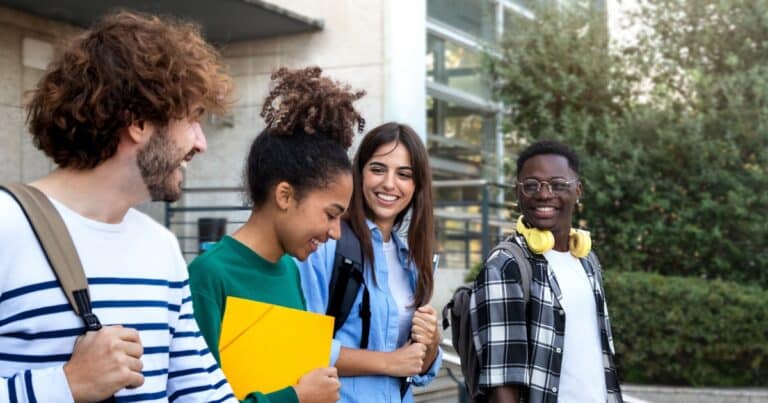How do mastery-based education and culturally responsive education complement each other? The Culturally Responsive Mastery-Based Education (CR-MBE) research project investigated how eight New York City middle and high schools incorporated both practices.
Bringing the two together requires an understanding of how they function apart. Culturally responsive education comprises pedagogical and school practices that embrace the forms of expression, linguistic practices and worldviews of BIPOC students in the content and processes of school. On its own, mastery-based education – an approach with measurable learning goals that students master at their own pace through personalized pathways – is not enough to center Black, Indigenous and other students of color. Recognizing this, the Mastery Collaborative, a program that supports mastery-based education in New York City Department of Education Schools, began to incorporate culturally responsive practices to create better educational experiences for students of color, students with disabilities and multilingual learners.
The research focused on capturing culturally responsive and mastery-based education at three levels within the study schools:
- School-wide policies and practices
- Teacher mindsets and practices
- Student experiences
We drew from five types of data:
- Publicly available administrative data
- Observations
- Student surveys and student interviews/focus groups
- Teacher surveys and interviews with teachers, administrators and staff
- Documents submitted by study participants
Overall, findings demonstrate that schools had well-honed school- and classroom-level systems for mastery-based education that students largely appreciated. Culturally responsive education policies and practices were not as visible for students and were less systematic, with the exception of some individual teachers’ mindsets and practices.
School-wide policies and practices
What was culturally responsive and mastery-based education implementation like at the study schools?
All schools shared strong mastery-based education systems. Teachers, staff and administrators cited school- or department-wide mastery-based grading policies, practices and grading platforms. However, interviewees did not regularly incorporate culturally responsive learning targets or culturally responsive ways to assess or demonstrate mastery.
Advisory groups stood out as one promising school-wide practice to bring mastery-based education and culturally responsive education together. In advisory groups, each teacher is assigned a small group of students with whom they discuss learning goals, engage in social-emotional learning and connect with families. While few schools in our study took up culturally responsive education comprehensively in advisory groups, we did see evidence that these groups could be utilized for discussions that raise sociopolitical awareness and to probe school-wide equitable change.
Are schools ready to implement culturally responsive mastery-based practices?
Teachers, staff and administrators described the most helpful resources and supports to grow their culturally responsive and mastery-based practices. These included:
- Collaboration with other educators
- Attending professional development
- Receiving feedback from students
- A handful of educational texts
Existing culturally responsive and mastery-based education literature indicates the importance of classroom climate, student autonomy and decision-making and supportive student-teacher relationships for culturally responsive education and mastery-based education practices to take root and flourish. Findings from the teacher survey reveal that the schools in the study possessed those key components. The researchers leading this study believe that if leaders and stakeholders continue to operationalize these components strategically, they could provide multiple opportunities for culturally responsive and mastery-based practices to continue to elevate student achievement, belonging and well-being.
Teacher attitudes, beliefs and practices
What do teacher attitudes and beliefs reveal about how they center students?
How teachers come to know students is essential to how teachers implement student-centered practices like culturally responsive and mastery-based education. The majority of teachers appeared to know students within a classroom or school context, but few could talk about their students as members of a family or community or as part of a larger society. Ultimately, teachers’ understandings of students positioned them well to carry out notions of student-centeredness that align with mastery-based education, though not with culturally responsive teaching.
How was mastery-based education represented in teacher practice?
Surveys indicate that the majority of teachers across school level, school group and subjects taught are fairly confident in their ability to assess students’ academic and developmental needs. In interviews, many teachers reported engaging an ongoing, varied process of assessment in their classrooms by assessing skills at several points through the full school year and providing constant and thorough feedback to students.
How was culturally-responsive education represented in teacher practice?
The majority of teachers in the study embraced access-based practices rather than transformative practices that would align more fully with a culturally responsive education lens.
Teachers utilizing access-based practices reported being inclusive to young people whose social identities cause them to be regular targets of oppression. Many of these teachers were highly attuned to how their students learn and they desired to be culturally responsive, but their vision of culturally responsive education is about inclusivity and access to learning targets and activities that are teacher-decided with little incorporation of students’ cultures.
Teachers engaging in transformative practices found ways to disrupt typical power dynamics by co-constructing classroom learning, consistently addressing inequities that arose and making learning about social change a regular part of classroom instruction.
Student experiences in classrooms
How did students experience mastery-based practices?
Most students had favorable mastery-based education experiences and described the benefits of being in mastery-based classrooms. Specifically, students appreciated and benefited from the grading transparency their teachers practiced alongside rubrics and the ability to retake or revise assignments, tests and projects. Several students warned interviewers about the potential dangers of mastery-based classrooms, stating that without support from teachers and staff, and developing perseverance, the practices can sometimes over-rely on motivation and students may not feel challenged.
How did students experience culturally responsive practices?
When students were asked about whether they feel their needs and identities were centered at school, they mostly shared one-day diversity events such as potluck meals and block parties and discussions during their advisory groups. Other students spoke to the lack of cultural inclusion in a permanent, everyday way with some students feeling that inclusion of cultural identities are largely symbolic. For example, students said courses in English language arts, global history, and advisory typically are spaces where questions of cultural identity are discussed, but these topics are not always common in other courses.
What this means for implementing culturally responsive and mastery-based education
Research showed that for these schools, while mastery-based education was interpreted as evident in practices and policies, culturally responsive teaching was treated as a more philosophical concept. It is important for schools working on cultural responsiveness to systematize its implementation and to define its systems in collaboration with students and families.
Authors Leah Q. Peoples, Pamela D’Andrea Martínez and Lindsey Foster, of New York University’s Metropolitan Center for Research on Equity and the Transformation of Schools, were members of the Student-Centered Learning Research Collaborative. They were the primary researchers in the investigation of culturally responsive and mastery-based practices in New York City schools. Funding for this research was provided by the Nellie Mae Education Foundation, the Oak Foundation, and the Overdeck Family Foundation.





